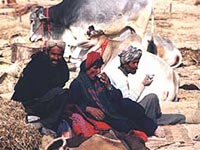|
Pakistan's
Balochistan… Contrasts Lead to Unrest
 |
|
Balochistan
is a hub of thriving investment activities
|
By
Asif Farooqi, IOL Correspondent
BALICHISTAN,
September 7 (IslamOnline.net) – The Pakistani tribal province of
Balochistan is little more than a land agog with scenes of contrast.
The
province – which covers a huge area in the southwest of Pakistan
bordering Afghanistan and Iran - is the main source of the country’s
oil riches.
Also,
it is a hub of thriving investment activities that pump foreign
currency into the country’s coffers, and seats many military
installations of the central government.
However,
the sparsely-populated province is the poorest in Pakistan -- a South
Asian country which is as large as slightly less than twice the size
of California.
No
wonder, feelings of resentment and injustice among local inhabitants
have been running high and attacks to vent this anger turn up as an
almost daily occurrence, analysts believe.
Deprivation
Tribal
and political chiefs have masterminded what they call armed resistance
against the construction of new cantonment areas and foreign
investment projects and foreigners working in the province.
Three
Chinese engineers who were working to develop a deep sea port in
Gawadar, the farthest town of the province, were killed in an attack
recently.
No
one claims responsibility of such attacks except an unknown BRA (Baloch
Resistance Army) -- which has claimed responsibility for some of
several attacks in the past few months.
"The
common man in Balochistan feels that the fruit of exploration of the
natural resources does not reach him," Nuzhat Jabeen, a professor
of International Relations at the Balochistan University explains to
IslamOnline.net.
As
the region provides natural gas to most parts of the country, still
many of its towns and cities are without this basic amenity of life,
Jabeen believes that deprivation is the main culprit of unrest among
the Baloch tribes.
Jabeen
went on: "Balochistan is in the throes of a low-level uprising
fuelled by resentment that other Pakistani provinces as Sindh and
Punjab as well as foreign investors are creaming off profits from the
region, while local residents see little improvement in their quality
of life."
Some
47 percent of the population lives below the poverty line, and the
official literacy rate is at 38 percent, 10 percent less than the
national rate, according to senior provincial government officials.
No
Military Bases
 |
|
Local
Balochi tribesmen
|
These
hard living conditions have pushed Pakistan’s largest, poorest and
the most underprivileged province into the grip of internal strife and
lawlessness these days.
Even
an un-announced military operation has not been able to scale down
attacks against military installations and personnel throughout the
province, especially in the areas which are hub of economic activities
or the ones rich with natural resources.
No
official data or record is available but estimates say more than two
dozen military or paramilitary forces have been killed and injured in
the last one month in attacks on military convoys, installations or at
public places.
The
central government’s plans to build three new military bases in
Gwadar, the Sui gas fields, and Kohlu, which has untapped oil and gas
reserves, have become the new focus for Baloch discontent.
But
the Marri tribe of Kohlu has vowed to block any garrison in their
area, fearing it would be used to protect foreigners exploiting local
resources.
"We
will not allow the foreigners to take control of our wealth, this is a
matter of life and death for us," Tahir Bazenjo, a leader of
another nationalist party BJP said.
Bazenjo
said once occupied by the "outsiders" these resources would
also rather be used to serve Punjab and other more powerful provinces.
The
planned garrisons are aimed at protecting foreign companies who would
dominate oil and gas exploration, he added.
Rising
Jobless Rates
Unemployment
among local inhabitants is another main concern.
Gwadar
Port, dubbed the main gateway to Central Asia, has become a key focus
of the simmering discontent. Local activists are angry that a few
number of the Baloch have been employed at the port and that little
revenue from construction activity has trickled into the local
economy.
Further,
"other development projects would attract people from other
places who may ultimately outnumber the local population, making the
Baloch a minority in Balochistan," Ali Kakar, a leader of the
leftist opposition nationalist party BNP told Islamonlone.net.
Kakar
said this is the conspiracy hatched by the Pubjabi Generals, referring
to the Pakistan army who gets the majority of its officers and
recruits from the powerful Punjab province.
"But
no one listens or talks to us, and this behavior of the government and
army was causing frustration among the local youth," he said.
"It
is our right to know what will be the ratio of employment of local
people and outsiders in these projects and how the profits will be
shared from the income of their resources."
Tribal
System
The
government blames unrest on tribal chieftains who, the government says
do not want the province to develop in terms of economy and social
liberties.
Some
analysts put the blame for all this mess over the tribal system of the
Province.
"The
root cause of the problem in Balochistan is the sardar system. People
are poor and simple and they are misled by tribal chieftains,"
Azimullah, a local journalist and commentator said.
"Sardars
don’t want progress and prosperity in the area fearing that it would
loosen their hold."
Balochistan
Province covers a huge area in the southwest of Pakistan.
|